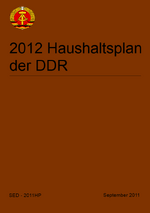| This article is under construction and/or revamp and will be completed at a later date. If this article has not been edited in several days, please remove this template. This article was last edited by BIPU (talk| contribs). (Update) |
| ‹ 2011· ·2013 › | |
 2012 Haushaltsplan cover | |
| Submitted | 2011, july 1st |
|---|---|
| Submitted to | Volkskammer |
| Parliament | Volkskammer |
| Treasurer | Andreas Klose |
| Total revenue | $ 2,354.20 billions |
| Total expenditures | $ 2,280.60 billions |
| Debt payment | $ 9.10 billions |
| Surplus | $ 73.6 billions |
| Debt | 3,801.00 billions (105% of the GDP) |
| Website | [1] |
The annual budget of the Deutsche Demokratische Republik is known as the Haushaltsplan der DDR. The primary purpose of the budget is to create an overview of the country's revenues and expenses for the following fiscal year or years. Since the budget is based on past expenditures, it is merely a prediction of the future which can lead to unexpected budget deficits as the fiscal year progresses.
As DDR is a planned economy and state has a core role in the economic life of the nation, the Haushaltsplan der DDR provides for a yearly expenditure between 60-65% of GDP while revenues from taxes account for about 30% of the GDP.
Budget process[]
In the first months of the fiscal year, the Sekretariat of the SED begins work on next year's budgets. First, the various committees are responsible for adjusting revenues and expenditures for the various items in accordance with the policy guidelines of the party and the Five Year Plans.
Once the first draft budget was prepared by the Sekretariat, the draft is reviewed and discussed by members of the Politbüro in a process that normally takes place between the months of March and April. With the corrections imposed by the Politbüro, the SED Sekretariat remade the budget and it is ready to be sent to the Staatsrat.
Usually the second week of May the Staatsrat receives the budget proposal from the SED. The budget is discussed by members of the council that may suggest some changes or correccions the party Sekretariat. In that case, the budget will again be reviewed by the Politbüro at the latest the first week of June.
In mid June, the Politbüro approved the final budget proposal and it is sent to the Ministerrat. According to the indications of the budget sent by the Politbüro, each ministry set the corresponding items of expenditure and finally the Ministerrat draws up the final budget to be sent to the Volkskammer in the first week of July.
During the next weeks of July and before the August break, the Volkskammer will debate and amend the budget to be returned to the Ministerrat for final approval in the first week of September. Once the budget is aproved, it becomes the Haushaltsplan der DDR for the next fiscal year that goes from 1 october to 30 september.
2012 Haushaltsplan der DDR[]
The complicated international financial situation and the pressure exerted by the international markets on the debt, makes deficit reduction one of the main objectives of the 2012 budget.
Revenues[]
Central government revenue consists of:
- taxes;
- social security contributions;
- income/profits from state holdings and state owned companies;
- fines.
| Item | Revenue ($ billions) |
|---|---|
| Tax Income | $ 1,086.00 |
| Total direct taxes | $ 496.00 |
| Individual income tax | $ 216.25 |
| Corporate income tax | $ 224.60 |
| Other direct taxes | $ 55.15 |
| Total indirect taxes | $ 590.00 |
| VAT | $ 349.40 |
| Excise duties | $ 101.65 |
| Import duties | $ 62.90 |
| Taxes on legal transactions | $ 26.75 |
| Motor vehicle tax | $ 22.80 |
| Tax on consumption of alcoholic drinks and tobacco | $ 18.80 |
| Other indirect taxes | $ 13.70 |
| Social Security Contributions | $ 482.30 |
| SS Contributions from individuals | $ 120.60 |
| SS Contributions from companies | $ 361.70 |
| Profits from state holdings and state owned companies | $ 776.10 |
| Fines | $ 5.40 |
| Other Extraordinary Incomes | $ 4.20 |
| Sell of state assets | $ 1.35 |
| Sell of state shares in companies | $ 2.85 |
| TOTAL BUDGET REVENUES | $ 2,354.00 |
Expenditures[]
| Item | Expenditure ($ billions) |
|---|---|
| Social Security | $ 477.90 |
| Labour Market | $ 91.40 |
| Care (Public Health) | $ 245.20 |
| Interest Charges (Debt) | $ 49.70 |
| Debt Repayment | $ 11.10 |
| Ministries Expenditure | $ 1,405.30 |
| Education culture, science and innovation | $ 353.70 |
| Defense | $ 260.40 |
| Municipal and district fund | $ 143.30 |
| Transport, Public Works and Watermanagement | $ 125.80 |
| Investments in state owned companies | $ 112.10 |
| Foreign affairs / development cooperation | $ 94.60 |
| Internal affairs and relations | $ 86.60 |
| Youth, women and families | $ 55.40 |
| Agriculture, Nature and Food Quality | $ 44.90 |
| Housing, spatial planning and the enviroment | $ 34.60 |
| Justice | $ 21.20 |
| Economic affairs | $ 17.50 |
| Finance | $11.80 |
| Other | $ 11.40 |
| TOTAL BUDGET EXPENDITURES | $ 2,280.60 |
